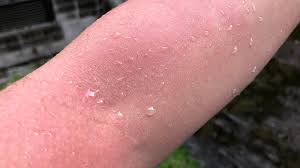Water, often celebrated as life’s essential element with the enduring saying “water has no enemy,” can, paradoxically, trigger discomfort and irritation for certain individuals upon contact with their skin.
You may have encountered someone experiencing intense itching or redness after bathing or touching water, prompting curiosity about the cause. This phenomenon is a skin condition known as aquagenic pruritus, which, despite its prevalence, remains largely undiscussed, leaving those affected unaware of its nature.
Aquagenic pruritus manifests as severe itching shortly after exposure to water, without visible symptoms like hives or rashes. Symptoms arise within minutes of water contact and can persist for an hour or longer, depending on severity. Any water temperature or type, including rainwater, can trigger this condition, with rainwater being the most common culprit according to research.
The exact cause of aquagenic pruritus remains elusive, though several factors may contribute. Genetic predisposition is suggested, as the condition can run in families, indicating a hereditary component. Certain medications, such as bupropion and antidepressants, have been linked to aquagenic pruritus, as have underlying medical conditions like polycythemia vera or autoimmune diseases.
Symptoms of aquagenic pruritus vary from person to person but commonly include severe itching, stinging, tingling, burning sensations, redness, and general discomfort upon water contact.
While there’s no cure for aquagenic pruritus, various treatments aim to alleviate symptoms. Oral antihistamines may help reduce itching and allergic reactions, while adjusting or discontinuing certain medications associated with the condition may offer relief. In severe cases, phototherapy, involving exposure to ultraviolet (UV) light, can mitigate inflammation and itching.
Additional measures to manage aquagenic pruritus include using tap water instead of rainwater for bathing, applying emollients, opting for warm water, avoiding harsh sponges, and adding baking soda to bathwater, which can help raise pH levels and alleviate symptoms, according to studies.
